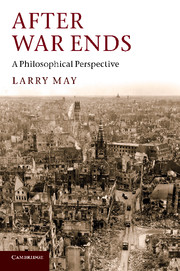Book contents
- Frontmatter
- Contents
- Acknowledgments
- Chapter 1 Introduction
- Part I Retribution
- Part II Reconciliation
- Chapter 5 Reconciliation of warring parties
- Chapter 6 Reconciliation and the rule of law
- Chapter 7 Conflicting responsibilities to protect human rights
- Part III Rebuilding
- Part IV Restitution and reparation
- Part V Proportionality and the end of war
- Bibliography
- Index
Chapter 5 - Reconciliation of warring parties
Published online by Cambridge University Press: 05 June 2012
- Frontmatter
- Contents
- Acknowledgments
- Chapter 1 Introduction
- Part I Retribution
- Part II Reconciliation
- Chapter 5 Reconciliation of warring parties
- Chapter 6 Reconciliation and the rule of law
- Chapter 7 Conflicting responsibilities to protect human rights
- Part III Rebuilding
- Part IV Restitution and reparation
- Part V Proportionality and the end of war
- Bibliography
- Index
Summary
One of the central worries of the previous chapters on retribution was that holding a criminal trial for war crimes sometimes makes reconciliation harder. Political reconciliation involves bringing parties to the point where they have respect for each other’s rights and can live peaceably together. After a war or mass atrocity it is especially hard to achieve reconciliation. In this chapter I will address this topic by examining how best to overcome post war attitudes of mistrust among previously warring parties, especially mistrust that they will not be treated with equal respect. I will focus on the attitudes that are generated due to policies of how the war or atrocity was conducted by soldiers or other agents of the State. While reconciliation is clearly a paradigmatic jus post bellum principle, I will address it also in terms of jus in bello in this chapter since it is underappreciated, I believe, how attitudes toward soldiers on both sides during war or armed conflict will affect the ability to achieve reconciliation after war ends.
The structure of the chapter is as follows. First, I will rehearse some of my previously published views about the nature of reconciliation. Second, I will describe the current debate about what jus in bello posture we should take toward soldiers who participate in unjust wars or who in some other way act immorally during war or times of political crisis. Third, I will explain in more general terms how jus post bellum considerations can affect jus in bello ones. Fourth, I will then revisit the conceptualization of political reconciliation in terms of post war attitudes toward those who have recently been one’s enemies, suggesting two normative principles that might be usefully applied to such situations. Finally I will discuss some objections to my diagnosis and solution to these problems of post war reconciliation. In this respect I will be especially concerned with the challenge that reconciliation is too amorphous a category to count as a jus post bellum normative principle.
- Type
- Chapter
- Information
- After War EndsA Philosophical Perspective, pp. 85 - 105Publisher: Cambridge University PressPrint publication year: 2012

